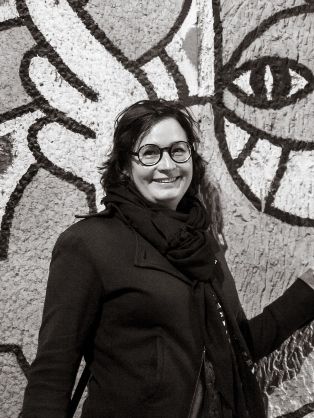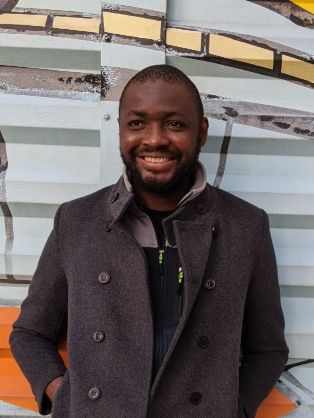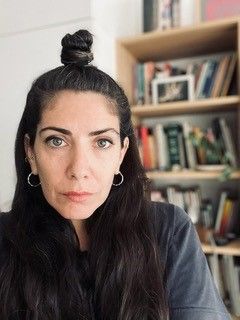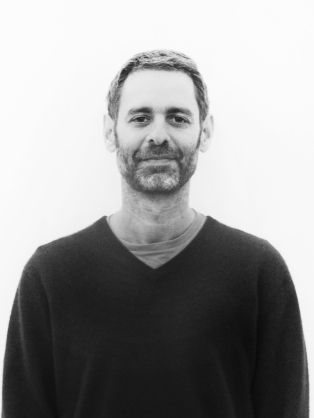Selecting the 2024 Talents: Interview with the Selection Committee
With 3,832 applications from 131 countries, our selection committee have had their work cut out for them this year. As they emerge from two months of intensive questionnaire-reading and work-sample-watching, we sat down with them for a discussion on what they were looking for in the applications, what stood out to them and more.

Beyond the obvious actual application requirements, what is it that you look for in the applications?
Dana: As a committee we look at different things: your professional experience of course, but also the question of whether this is a good time to come to the Berlinale Talents, can we offer you something and can you share something with the other Talents? That is why we are also interested in who someone is as a person, why does someone want to make films or audiovisual productions, what are the stories someone has to tell, what is their positionality in an ever-changing field?
Will: We are looking at candidates from around the world, which means a diversity of not just talent but of filmmaking cultures and professional achievements so there isn’t necessarily any one rule that fits all. But what I would say is that we are looking for outstanding candidates who can share their talent and experiences as much as they receive from the Summit or Labs in terms of professional support.
Gabor: Exactly, something outstanding, some special energy or original voice that makes the applicant stand out. The perfect talent should be sharing and motivated and, already have enough experience to be able to bring the necessary input to the Summit.
Will: Outstanding could mean candidates who have rich experience, it could be pure, undeniable talent, could be someone who has made some significant career move such as presenting their films at a major international festival, or perhaps someone who is at the career tipping point and Berlinale Talents can just help them across the line to the next level. It could be a clear demonstration of potential or it could be persistence. Some candidates can demonstrate all of these at once but that is rare, so it is usually one or a combination of factors that ultimately decides who is accepted at any given time. And don’t forget that we are selecting only 200 people out of a record almost 4000 applicants this year so it is extremely competitive.
Agustina: I think one of the most important things for me is what are they actually doing and how. As I see it, we live in a political world, so art is somehow a reflection of that concept. As an artist or filmmaker, it is important to have a deep understanding of what is happening worldwide and how engaged or not one is to reality. I think is part of the job to stay connected and address meaningful themes in whatever work one is doing. That doesn’t mean that films should be political propaganda, but in a way should be a reflection of significant topics, even if is a romantic comedy or a thriller, what is the concept behind it. So, in a way, I’m always looking for original cinematic ways of approaching human existence or experiences.
What makes an application stand out to you?
Gabor: An original voice, motivation and energy as well as a work sample which stays with me.
Will: Yes, a strong, carefully-selected sample that highlights the quality of their recent work is always a great way to go because then the work can speak for itself. It cannot be overstated how important that 3-minute clip or work sample is. For example, an actor who submits a sample where they are foregrounded in a strong scene is likely to be more enticing than one who is in the background just doing stuff. Ditto a producer or production designer who submits a clip where their skills or work is highlighted as effectively as possible. What you want is to make a strong impression to stand out from a pool of 4000 people.
Dana: For starting filmmakers, sometimes it is not always easy to choose a good sample; sometimes you simply don't have that much autonomy yet in what you want to make. Don't forget that we also look at how you speak about your work, how reflective you are, and whether you can argue why you have made certain choices.
Will: Exactly, an application that is thoughtful, detailed and reflective with proven demonstration of where they are in their early or mid-career.
Dana: Yes, it's wonderful to see a clip and think: 'Wow! We would like to invite this person'. But it is equally special to see that thoughtfulness reflected in the rest of the questionnaire.
Agustina: It's important to see how far they have been able to come given their own circumstances and which type of films they are trying to make. The sample in that sense is important to me. And of course, if they are trying to push filmmaking forward. I love the avant-garde films or non-conventional filmmaking, in terms of expanding filmic frontiers.
What’s your favourite part of being a member of the selection committee?
Will: I consider it a privilege to be able to encounter some of the most talented, creative and hardworking filmmakers working today. Berlinale Talents is often a bellwether for the future of filmmaking talent and getting a front row seat to observe and perhaps in a very tiny way, shape this part of international cinema will always be precious to me. It has also enriched my film criticism work as I go in to film festivals now looking out for potential talents.
Gabor: To discover new original voices and to feel the energy and originality of upcoming filmmakers – also from more hidden places of our planet.
Agustina: Yes, having the chance to watch and read about what is happening around the world, people's concerns and the type of films that are being made nowadays. I also really enjoy the discussion with my fellow committee fellows because enriches my vision about cinema in general.
Dana: We weigh and discuss and deliberate, but the selection is also a musical composition of as many voices and sounds as possible who want to explore together what cinema currently stands for. If you can find themes and motifs in there at the end, that's probably my favorite moment. Or no, when we all end up sitting in HAU1 during the opening and you see all those faces around you that you only know from profile photos, or see clips on the big screen that you saw in your office months before, then you feel the energy and the urgency that keeps cinema alive. That's magic.
Have you noticed any common themes across the applications this year?
Dana: This year we've seen a lot of questions about AI. From the fear that AI will take over the profession of actors, writers and, who knows, even directors, to relevant questions surrounding authorship and ethical issues.
Agustina: Oh yes! A lot of the applicants are concerned about AI and how that could affect their work.
Will: Yes, AI is increasingly becoming a concern for filmmakers, you can see it in their work but also their reflections and anxieties.
Gabor: I agree, it's definitely a common theme. It also seems that many applicants are trying to find their way back to normality after the long period of lockdown and separation.
Will: Yes covid is still casting a shadow on filmmaking three years after the first lockdowns. Many independent filmmakers who took a pause then are only now getting back to making or distributing their work and this has also changed how people go about making films or collaborating. Then a thing like the writers and actors strike in Hollywood has had repercussions on several other places that depend on the United States in some way. Because of the localization of streaming content, a lot of film industries are now being boosted by resources from the streaming platforms so it's interesting to see people having opportunities now that weren’t necessarily present five, ten years ago.
Dana: It seems to me that the filmmakers who apply are also more aware than ever of their positionality, of your starting position from which you make films, than a few years back. At the same time, more "content" than ever is being produced, and it may have an increasingly higher production value, but the question we also hear is how many images should you add to a world that is already so saturated with images. And how, for example, you can be so careful with documentaries that you do not ride on hype or misinformation, and how you can really make something that is more than a reportage.
Agustina: Also, inclusion and diversity of voices in films, trying to leave behind gender and ethnic stereotypes, as well as how can one finance films. And last but not least, climate change and sustainability.
Will: One thing I will say is there is still a general enthusiasm amongst the candidates to come to Berlin as we get several returning applicants.
Dana : It's a great question as there is a lot of consultation between the members of the committee and the Berlinale Talents team. Every year, this leads to insights into how the profession is changing, and often also to ideas for the programme and master classes during the Berlinale.
What is your top tip for those who would like to apply next year?
Dana: I'm always surprised that people don't care to make their application as complete as possible. Experienced professionals who have three films in their filmography, which at first glance makes it seem that they are inexperienced. Then there is a good chance that your registration will be misread. Fortunately, several people look at every registration. The opposite also happens: people bluff their way through and describe every workshop with a well-known director as a collaboration. Ultimately, it's best to just be honest. If there's a gap in your filmography, explain that you had a baby or worked as a teacher or as a bricklayer to finance your next film. Those are the things that really matter to see someone as a professional and as a person.
Agustina: Yes exactly, just to be honest and highlight your professional milestones, and it's always nice to hear the motivation behind the application! Why would you like to participate or even what are your expectations regarding the Summit?
Gabor: Right, try to be specific in your answers, tell us more about your motivation and the force that makes you want to be a filmmaker. Usually really helpful is the little video in which you explain your pressing subject matter because it gives us a good impression about you.
Will: As an alumnus of the program, I would say believe in yourself, first and foremost, and find a way to put that confidence forward in the applications. Now would be a great time to start thinking about what you want to express to us next year. Reflect deeply on the questions and fill them out to the best of your ability, highlighting your strongest qualities and even some of your weaknesses. You want to put some effort into the application as this often ensures you are taken more seriously. Be thorough, a thing like listing out your complete list of credits or updating your IMDb profile can go a long way. In the meantime, continue to make the best work that you can. Goodluck and Godspeed.
Selection Committee Members
Dana Linssen is a Dutch film critic, philosopher and writer. She is the former editor-in-chief of de Filmkrant magazine, a long-standing film critic for NRC Handelsblad, the founder of the Slow Criticism Project and a curator of the Critics’ Choice at the International Film Festival Rotterdam. She has received several awards for her work as a film critic and has served as a Talent Press mentor for many years.

Wilfred Okiche is a film and culture critic with considerable experience in African and international cinemas. He has attended critic programs and reported from film and theater festivals in Locarno, Rotterdam, Stockholm and Sundance. Wilfred has worked in programming teams for Film Africa in London and the Encounters International Documentary Festival in South Africa. Wilfred has mentored fast rising film critics at Talents Durban. This is his third year on the selection committee of Berlinale Talents. His writing has appeared in Variety, IndieWire, The Continent and Senses of Cinema among other publications. He is a member of FIPRESCI and has participated in juries at the Berlinale and the Carthage film festival. He is in first year of grad school studying film and media studies at the University of Southern California.

Agustina Arbetman - Cinema director graduated from the University of Cinema and graduate in Creative Writing from UNTREF. Works professionally in the area of programming and curatorship since 2008, being the Program Coordinator of Talents Buenos Aires among others. Taught diverse staging courses as well as literature and curated short film programs for festivals in Africa, Asia and Europe. On the side, she develops her independent artistic practice and her latest pieces participated in the National Prize 8M 2021 and 2022 respectively and both works were exhibited at the Kirchner Cultural Center. She received a grant from the National Fund for the Arts to develop her upcoming theatre play. In the past years she was a jury member of FIDOCS (Chile) and tutor of DOCSMx (Mexico), in both cases in the emerging artists section. Her first published book was presented in May 2023 at the International Book Fair Buenos Aires.

After his studies of Cultural Management in Vienna, Birmingham and Chicago, Gabor Greiner worked as a journalist and film critic. In 2003, he moved to Brussels to take charge of the distribution support department of the MEDIA Program at the European Commission’s Film Fund. In 2009, Gabor became acquisitions executive at the international sales agent, The Match Factory. In August 2010, Gabor moved to Berlin to take over acquisitions of the French-German sales company, Films Boutique, winner of the Golden Bear in 2017 and 2020 and the Golden Lion in 2011 and 2016. Gabor is a member of the European Film Academy.
